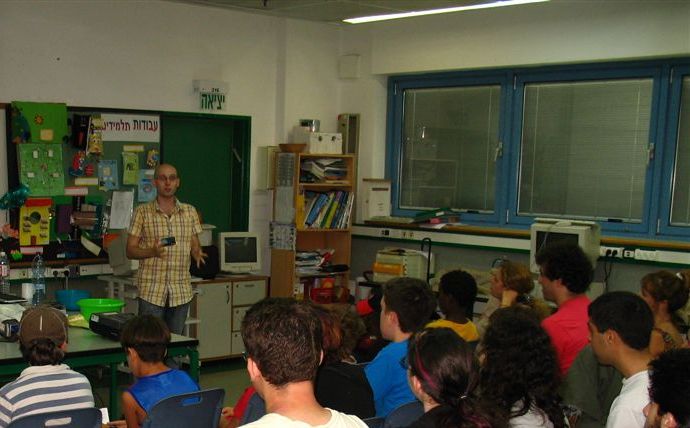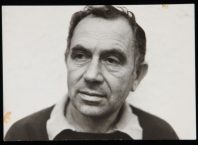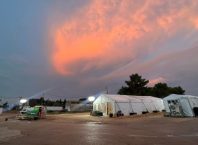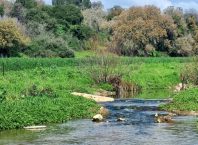
“Four scientists, four different topics, one stage, no planning – just passion,” says Roey Tzezana, the peripatetic organizer of “Science at the Tip of the Fork.” Somewhere between theatre and science, the group’s next performance will be at the Olamot 2010 Science Fiction and Fantasy convention on March 31, at ZOA House in Tel Aviv with a program of magic and science. Optical illusions, body mechanics, astronomy and paranormal phenomena are on the program – all in short, funny and utterly fascinating performances that are also scientifically accurate. How did this amazing group get started? It all began when Roey read an ad in the newspaper for the first Israeli Fame Lab competition in 2007.
As someone who likes to talk about science (currently working on his Ph.D. in nanotechnology) Roey entered the competition, thinking that at worst, he’d have an interesting experience. As it turned out, this was the beginning of an adventure and a project that is ongoing and growing.
The Fame Lab challenge is to give a 3 minute talk on any scientific topic. “There were about 25 people there for the first round of auditions,” recalls Roey, “I spoke about why we get a fever when we’re sick. The body fools the brain – and makes us think that we are cold. Usually the brain sends instructions to the body; in this case, it’s the opposite.”
Having made it through the first cut, contestants had to give a talk on a second topic that same evening. “The second round was amazing,” said Roey, “Alon Biran explained why you can’t bake a cake in the microwave, and Eran Schenker, Head of the Aerospace Medical Research Center at the Fisher Institute for Air and Space Strategic Studies talked about why babies can’t be born in outer space – it turns out that gravity plays a role in directing the fetus to grow the head in its proper place.”
Roey’s second talk was about embryonic stem cells – what do they do and why are they important – which is part of his doctoral research. Roey was chosen along with 8 other finalists (3 are chosen in each of the audition locations) to compete in the final round. Although the winner receives prizes, including a trip to the Cheltenham Science Festival in the UK, the real prize, according to Roey, is a two day workshop on science communication.
Frank Burnet, founder and co-director for five years of the Cheltenham Science Festival and part of the team that developed FameLab, conducted a day-long workshop for the nine finalists that made a strong impact on the entire group. An actor and biochemist who “has the energy of a three year old, leaping up on tables, shouting in an Irish accent” Burnet shared his passion for communicating science, teaching them not only how to talk about science and organize events, but also why it is so important to communicate science to the general public.
“After the workshop, we decided that it is too interesting to end here; we wanted to create a group that would bring science to the public in different ways…but how? Eventually, the organization evolved through our activities,” said Roey. The group gave their first performance at ICON 2008. It was a full day with three performances and scientific attractions such as liquid nitrogen and superconductors, they called it “Science on the Tip of the Fork” – and the name stuck.
Today, the group includes about 30 young enthusiastic scientists (it is open to all interested scientists) who make time in their busy schedules to speak in schools, conferences – anywhere they are invited. There are two formats for talks: either a single lecturer gives a 45 minute to 11/2 hour talk, or there is a presentation of 4 speakers, each giving a ten minute talk on a different subject. They coordinate topics to avoid repetitious overlap, but essentially, each person talks about topics that interest her/him. Roey is the hub of “Science on the Tip of the Fork” coordinating between groups and speakers – “someone had to do it,” he says.
What can be conveyed in a ten minute talk? Clearly, the information has to be simplified and there isn’t much room for detail. Does this detract from the message? Not at all, according to Roey: “As a researcher I need to know every detail about the genes I am working with, I need to read all the relevant articles, know how they all interconnect. If I collaborate with an electrical engineer to grow cells on electrodes, I need to understand the genetics and he needs to understand the electronics, but he has no need to understand molecular biology. That is popular science – every time there is collaboration between researchers in different scientific fields, the communication between them is popular science – and the most interesting results come from collaboration.”
In their talks, group members provide information about current scientific research, giving the audience a sense of what scientists are focusing on today and what might be the future potential of such research.
“It’s a taste,” says Roey, “on the tip of the tongue, and perhaps this first taste will give people a taste for more.”
For those interested in a taste, the supply is varied and plentiful:
Olamot Science Fiction and Fantasy Conference, March 31 at ZOA House Tel Aviv
16:00 Presentation by members of the Bio-medical Engineering Dept. at the Technion – Tissue engineering, treatment for diabetes, and Roey will talk about Cyberdyne, an ironman-like exoskeleton that has been developed in Japan.
17:00 “Science on the Tip of the Fork” – Science and Magic
Shani Waidergoren will present optical illusions, Bat Sheva Wagon- Galmidi will talk about body mechanics, Yoav Landesman on astronomy and Roey will demonstrate paranormal phenomena and explain the scientific principles that make them seem possible.
Fame Lab 2010 is coming!
Auditions will take place on April 13 at the Technion in Haifa, April 14 at Hemda in Tel Aviv and April 21 at the Bloomfield Science Museum in Jerusalem. Additional information and online registration is available on the Hemda website. Fame Lab 2010 is organized by Hemda and supported by Teva and the British Council.
To get an idea of what Fame Lab is like, check out the youtube clip of Roey Tzezana at the first Fame Lab Israel sponsored by the British Council in 2007:






LIKE!!!
Everyone can understand what you say. Thanks 🙂
[…] scientists with shared goals. One result has been the establishment of Mada Al Ktzeh HaMazleg (Science on the Tip of the Fork), a group of Fame Lab “graduates” who are available to lecture on science and often present […]
Comments are closed.